五升六英语知识要点.pptx
五升六语法翻译知识点

一、词类:1、名词这里强调两点:不可数名词都默认为单数,所以总是用is名词复数如何加后缀:2、人称代词和物主代词人称代词:有主格和宾格之分。
一般动词前用主格,动词后用宾格。
3、指示代词4、冠词a、a n、thea和an的区别:an用于元音音素(一般就是元音字母a、e、i、o、u)前,,a用于辅音音素前。
二、否定句:be动词(am、is、are)+not情态动词can+ not助动词(do、does)+ not如何将一个肯定的陈述句改为否定句1、看句中有无be动词,如有,直接在be动词后+ not。
2、看句中有无情态动词,如有,直接在情态动词后+ not。
3、如上述二者都没有,就应用助动词+ not。
分四个步骤:(1)肯定陈述句中本来是没有助动词的,要加上去,位置在主语(某人或某物)后,动词前。
(2)确定助动词用do、does,根据句中动词,动词是原形的助动词就用do,动词是第三人称单数的助动词就用does,(3)在助动词后加not。
(4)原句中动词假如发生变化就要恢复成原形。
强调一点,有some的要考虑是否要用any。
三、一般疑问句。
如何将一个肯定的陈述句改为一般疑问句:1、看句中有无be动词,如有,把be动词提到句首即可。
2、看句中有无情态动词,如有,把情态动词提到句首即可。
3、如上述二者都没有,就应把助动提到句首。
分四个步骤:(1)肯定陈述句中本来是没有助动词的,要加上去,位置在主语(某人或某物)后,动词前。
(2)确定助动词用do还是does,根据句中动词,动词是原形的助动词就用do,动词是第三人称单数的助动词就用does(3)把助动词后提到句首。
(4)原句中动词假如发生变化就要恢复成原形。
强调一点,有some的要考虑是否要用any。
四、特殊疑问句。
表示疑问,有疑问词(在开头),回答有很多种可能。
常用疑问词:五、时态1、一般现在时(1)一般现在时中的be动词:一般用原形:am、is 、aream用于第一人称单数(I);is用于第三人称单数(he 、she 、it和其他人名或称谓,如:Ben 、his 、sister等);are用于第二人称单数(y ou)和所有复数(包括第一人称复数we、第二人称复数y ou;第三人称复数they和其他复数,如the children 、 his 、parents等)。
小学英语五升六暑假讲义:专题五 ---- 有关天气各类词性的运用 译林版三起
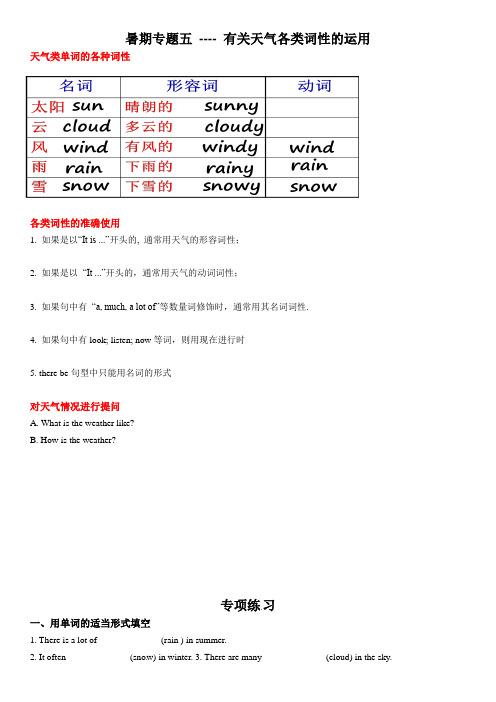
暑期专题五---- 有关天气各类词性的运用天气类单词的各种词性各类词性的准确使用1. 如果是以“It is ...”开头的, 通常用天气的形容词性;2. 如果是以“It ...”开头的,通常用天气的动词词性;3. 如果句中有“a, much, a lot of”等数量词修饰时,通常用其名词词性.4. 如果句中有look; listen; now等词,则用现在进行时5. there be句型中只能用名词的形式对天气情况进行提问A. What is the weather like?B. How is the weather?专项练习一、用单词的适当形式填空1. There is a lot of _____________ (rain ) in summer.2. It often _____________ (snow) in winter.3. There are many _____________ (cloud) in the sky.4. It is _____________ (snow)today.5. We often see much heavy _____________ (rain) in summer.6. It can be _____________ (cloud) tomorrow.7. There is much ________(snow) in winter here.8. Is it ________(rain) outside now?9. It _________(rain) heavily last night, but today it is________(sun) now.10. Is it going to__________(rain) tomorrow?11. Was it ___________(snow) last year?12. There are many _________(cloud) in the sky.13. Is it __________(cloud) today?14. Did it ___________(rain) last night?15. Was it _____________(snow) yesterday?16. There are many _________ (cloud) in the sky.17. It is ________ (cloud) today. Let's stay at home.18. It _______ (rain) heavily.19. Look! It _____________ (rain) hard now.20. There is so much _______ (rain) today.21. It is ________ (rain) today.22. --- Does it __________(rain) every year here? ---- Yes, it is ________(rain) here.23. ---- Did it ________ (snow) last night? ---- No, but there was much ______(rain) last night.24. --- What was the weather like? ---- It was ________(snow).25. --- Look! It _________(rain) heavily outside. --- I want to know when it will stop.26. There is ___________(snow) every winter. But it often _______(not rain) in summer here.27. It was ______(sun) in the morning. But it ______ (rain)in the afternoon.28. --- ______it _________(rain) now? --- No, it isn’t.29. How much ________(rain) is there in Wuxi?30. --- Was it _________(cloud) yesterday? --- No, there weren’t any black __________(cloud)in the cky.二、单选题1. It ______ heavily yesterday, but today it is ______.A. rainy; snowyB. rained; snowC. rained; snowyD. rainy; snowed2. Is it _______ now? No, it isn’t.A. rainingB. rainyC. rainedD. rain3. Did it ______ last year?A. snowyB. snowedC. snowD. snowing4. There was much ______ in summer. And it is always ______.A. rain; rainyB. rainy; rainyC. rain; r ainD. rainy; rain5. --- Was it _______ last night? ---- No, it ________ last night.A. snow; rainB. snowy; rainC. snowy; rainedD. snowed; rainy6. It often ___________ here in winter. Look! It ___________ now.A. snows; is snowingB. snows; snowsC. is snowing; snowsD. is snowing; is snowing7. —— _____ it often windy in Huai’an in spring?——Yes.A. DoesB. IsC. DidD. Was8. ---- _____ it often rain here?A. DoesB. IsC. DidD. Was9. It was _________ here yesterday. Look! It ___________ now.A. snows; is snowingB. snows; snowsC. is snowing; snowsD. snowy; is snowing10. There is many black ________ in the sky. It is going to ____________.A. cloudy; rainyB. clouds; rainC. clouds; rainyD. clouds; rained11. It ______ sunny in the park this morning. It _______ .A. was, rainyB. was, rainedC. wasn’t, rainyD. wasn’t, rained12. ______it often ________?A. Is; rainingB. Does; rainsC. Is; rainyD. Did; rain13. ----It isn’t _________ today, but it _________ yesterday.A. rainy; rainyB. rain; rainyC. rainy; rainedD. rain; rain14. There was much _____________in summer. But it wasn’t __________in winter.A. rain; snowyB. rainy; snowyC. raining; sno wyD. rain; snow15. It didn’t __________ today.A. snowB. snowyC. snowingD. snowed16. Look! It ___________ . But it was___________ yesterday.A. rains; sunnyB. rainy; sunnyC. raining; sunnyD. is raining; sunny三、句型转换1. It was rainy yesterday. (同义句)It ___________ yesterday.2. Was it snowy last night? (同义句)__________ it __________ last night?3. There was a lot of rain in spring. (一般疑问句)_______ ______ a lot of rain in spring?4. It is sunny and windy today. (对划线部分提问)______ the weather ______ today?_________ the weather?5. It is raining hard outside. (一般疑问句)_______ it ________ hard outside?6. There is much rain today. (同义句)It _______ ________ today.7. Was it rainy las t night? (同义句)________ it rain last night?8. There are many black clouds in the sky. (同义句)It _________ _________ in the sky.专项练习答案一、用单词的适当形式填空1. rain2. snows3. clouds4. snowy5. rain6. cloudy7. snow8. raining9. rained; sunny It 10. rain11. snowy 12. clouds 13.cloudy 14. rain15. snowy 16. clouds 17. cloudy 18. rained 19. is raining 20. rain21. rainy22. rain; rainy 23. snow; rain 24. snowy 25. is raining26. snow; doesn’t rain 27. sunny; rained 28. Is raining - 29. rain 30. cloudy clouds二、单选题CACAC ABADB BCCAA D三、句型转换1. rained2. Did snow3. Was there4.What’s like; How’s5. Is raining6. is rainy7. Did8. is cloudy。
最新小学英语五升六授课内容整理
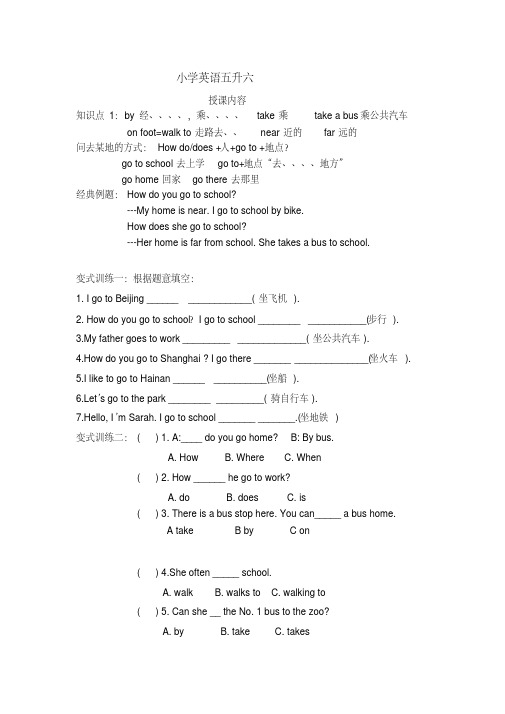
小学英语五升六授课内容知识点1:by 经、、、、,乘、、、、take 乘take a bus 乘公共汽车on foot=walk to走路去、、near 近的far远的问去某地的方式:How do/does +人+go to +地点?go to school 去上学go to+地点“去、、、、地方”go home 回家go there 去那里经典例题:How do you go to school?---My home is near. I go to school by bike.How does she go to school?---Her home is far from school. She takes a bus to school.变式训练一:根据题意填空:1. I go to Beijing ______ ____________( 坐飞机).2. How do you go to school?I go to school ________ ___________(步行).3.My father goes to work _________ _____________( 坐公共汽车).4.How do you go to Shanghai ? I go there _______ ______________(坐火车).5.I like to go to Hainan ______ __________(坐船).6.Let’s go to the park ________ _________( 骑自行车).7.Hello, I’m Sarah. I go to school _______ _______.( 坐地铁)变式训练二:( ) 1. A:____ do you go home? B: By bus.A. HowB. WhereC. When( ) 2. How ______ he go to work?A. doB. doesC. is( ) 3. There is a bus stop here. You can_____ a bus home.A takeB byC on( ) 4.She often _____ school.A. walkB. walks toC. walking to( ) 5. Can she __ the No. 1 bus to the zoo?A. byB. takeC. takes( ) 6. How does she go _______ there?A. toB./C. over( ) 7. My home is _____ our school. I can go on foot.A. not farB. nearC. far from变式训练三:根据句子意思,填上正确的单词。
小学英语外研版五升六学习资料
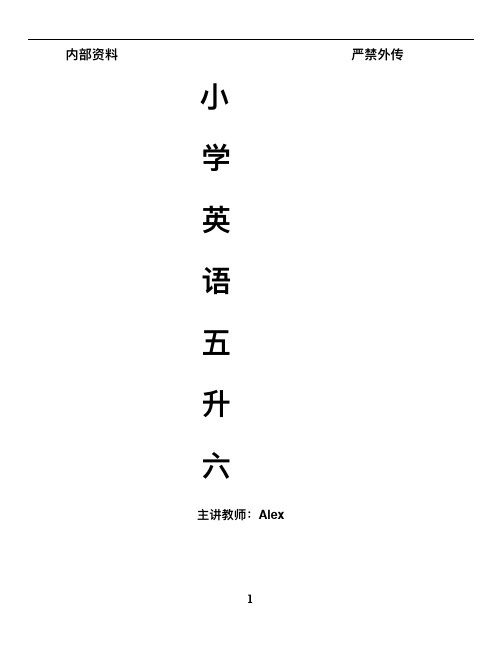
内部资料料严禁外传⼩小学英语五升六主讲教师:Alex五年年级英语下册复习重点(外研版)第⼀一模块:单词短语1. many years ago 许多年年前2. live in a small house 住在⼀一所⼩小房⾥里里3. enough food ⾜足够的⻝⾷食品4. how about 怎么样5. lots of buses and cars许多公共汽⻋车与⼩小汽⻋车6. every day 每天7. talk to 和…交谈8. miss China 想念中国9. four years ago 四年年前10. last night 昨天晚上11. a television programme about China ⼀一个关于中国的电视节⽬目12. talk about 谈论 13. cook on a fire 在炉⽕火上做饭14 work in the fields 在⽥田地⾥里里劳作句句型1、There was(were)+某⼈人或某物+某地2、过去式:We didn’t have enough food .句句型:肯定句句:主语+动词过去式+其他否定句句:主语+be动词过去式+not+其他或主语+did not+动词原形+其他第⼆二模块:短语1. in lots of Chinese cities 在许多中国城市2. foreign language 外语3. learn English 学习英语4. welcome to Beijing 欢迎到北北京来5. make a cake 做蛋糕6. do homework 做家庭作业7. in his class 在他的班级8. a good pupil ⼀一个好学⽣生9. study hard 努⼒力力学习10. an English teacher ⼀一位英语⽼老老师11. walk to school ⾛走路路去学校12. by school bus 乘坐校⻋车句句型1、询问他⼈人做过某事的句句型及回答句句型例例:Did she learn any foreign languages?问:Did+主语+动词原形+其他答:Yes ,⼈人称代词主格+did .或No ,⼈人称代词主格+didn’t .2、描述他⼈人做过某事例例:She learnt English . 主语+动词过去式+其他3、描述他们现在在做某事例例:He is learning English now .主语+be+动词ing+其他第三模块:短语1.have got 拥有2.an e-mail from Linglin⼀一封来⾃自玲玲的电⼦子邮件3.about English food 关于英国⻝⾷食物4.have an English breakfast 吃了了⼀一顿英式早餐5.have …for lunch 吃…作为午餐6.a traditional English dinner ⼀一顿传统的英式晚餐7.very different ⾮非常不不同8.give …to … 把…给…9.at school 在学校10.cook Chinese food for Lingling 为玲玲做中式⻝⾷食物11.be going to 打算12.tell a story 讲故事句句型1、描述吃过某些⻝⾷食物:主语+ had + ⻝⾷食物名称+ 其他2、询问他⼈人打算吃/喝喝什什么:What are you going to eat/drink ?3、询问他⼈人三餐吃了了什什么:What + did + 主语+ have + for breakfast / lunch / dinner ?第四模块:单词短语Library 图书馆; find 找到; CD-ROM 电脑光盘; bring带来; use使⽤用; card 卡⽚片; easy简单的; information信息; timetable时间表; dictionary字典; newspaper 报纸.1. want to 想要2. make an e-card for Mum 为妈妈制作⼀一张电⼦子卡⽚片3. be good at 擅⻓长4. go to the library 去图书馆5. find a book about e-cards 找到⼀一本关于电⼦子卡⽚片的书6. at the library 在图书馆7. the book about computers 关于电脑的书8. on Shelf C 在C架上9. library card 借书卡10. bring back 带回来11. in two weeks’ time 在两周时间内12. use our computer 使⽤用我们的电脑13. be easy with ⽤用……很简单14. find out 找到、找出15. in this dictionary 在这本词典⾥里里16. on this CD-ROM 在这张光盘上17. in this newspaper 在这张报纸上18. at the zoo 在动物园19. on TV 在电视上句句型询问某物在何处及回答的句句型:1、Where are the…about…,please ?2、Where can you find out about …?3、You can find out … in / on …第五模块短语1. take it to China 带它到中国2. buy you a new one 给你买⼀一个新的3. this black bag 这个⿊黑包4. two pockets 两个⼝口袋5. big and light ⼜又⼤大⼜又轻6. be easy for you 对你来说很容易易7. at the department store 在百货商店8. a panda on it 有⼀一个熊猫在上⾯面9. be too…for 对…来说太… 10. take…to… 把…带到…句句型1、描述事物特征的句句型:It’s get… (big反义small; heavy反义light; easy反义hard)2、表达看法:It’s + 形容词+ for +⼈人称代词宾格第六模块短语1. of course 当然2. photos of China 中国的照⽚片3. in the west of China 在中国的⻄西部4. go there 去那⼉儿5. last year 去年年6.go with your mother and father 和你的妈妈、爸爸⼀一起去7. stay with 和…呆在⼀一起8. in July 在七⽉月9. live there 住在那⼉儿10. every year 每年年11. Li people 黎族⼈人12. visit her friend 拜访她的朋友13. ride a horse 骑⻢马14. climb the Tianshan Mountain 爬天⼭山15. visit the Tianchi Lake 参观天池16. have a lovely time 度过⼀一段愉快的时光17. a lot of /lots of 许多句句型1、⼈人称代词和物主代词的区别和⽤用法;2、⽤用⽅方位词表达地点:It’s in the north / south / east / west of….第七模块短语1. send an email 发送电⼦子邮件2. a computer message 电脑信息3. from…to … 从…..到…..4. a good idea ⼀一个好主意5. an idea ⼀一个主意6. click on 点击7. write your message 写你的信息8. at work 在⼯工作9. an email from little Tom ⼀一封来⾃自⼩小Tom的电⼦子邮件10. make a poster 制作海海报 11. thank you for… 为……⽽而感谢12. work hard 努⼒力力⼯工作13. at the office 在办公室14. be busy 忙碌的15. be home 在家16. at seven o’clock 在七点钟17. on the train 在⽕火⻋车上18. stand up 起⽴立19. run to the blackboard 跑向⿊黑板20. on the blackboard 在⿊黑板上句句型1、another和the other : another⽤用于三者以上的“其中⼀一个”,the other⽤用于两者之间2、英语时间的表达:①10:00 ten o’clock ②1:58 one fifty-eight③7:10 ten past seven ④9:48 twelve to ten⑤4:45 a quarter to five ⑥9:30 half past nine第⼋八模块短语1. come quickly 快来2. on the phone 在通话中3. be excited 激动的4. in the summer 在这个夏天5. take a present for my cousin 为我的堂弟带⼀一份礼物6. a Chinese dragon kite ⼀一个中国⻰龙的⻛风筝7. the same as 与…..相同8. I think so ./I don’t think so. 我认为这样./我认为不不这样9. go to a party 去参加聚会10. wear a beautiful dress 穿着漂亮的⾐衣服句句型1、表示建议的⼏几种⽅方法:(1)What about …. ? ……怎么样?(2)Why don’t you … ? 你为什什么不不……呢?(3)How about … ? ……怎么样?2、形容词⽐比较级的构成:第九模块短语1. in English ⽤用英语2. last week 上周3. go to a children’s theatre 去⼉儿童剧院4. wear women’s clothes 穿⼥女女⼈人的⾐衣服5. wear men’s clothes 穿男⼈人的⾐衣服6. tell jokes/ tell a joke 说笑话7. laugh a lot ⼤大笑,笑个不不停8. after the show 表演之后9. go to a restaurant 去餐馆10. be ready for….. 为……做好了了准备11. your trip to America 你去美国的旅⾏行行12. last night 昨天晚上13. in three weeks /in three weeks’ time 在3个周的时间内14. buy …for… 为……买……15. a book about Chinese history ⼀一本关于中国历史的书16. ask you some questions 问你⼀一些问题17. borrow a bike for you 为你借⼀一辆⾃自⾏行行⻋车18. CDs of Chinese songs 中国歌曲的光盘19. listen to 听20. in the evenings 在晚上21. See you soon. 再⻅见句句型描述某⼈人过去、现在、将来做某事:1、主语+ 动词过去式+ 其他2、主语+ be + 动词ing + 其他3、主语+ be going to + 其他第⼗十模块短语1. feel nervous 感到紧张2. make a list of things to do 列列⼀一个要做的事情的清单3. go to the airport 去⻜飞机场4. this weekend 这个周末5. go there 去那⼉儿6. at the airport 在⻜飞机场7. in a yellow taxi 乘⼀一辆⻩黄⾊色的出租⻋车8. tall buildings ⾼高楼9. speak English/Chinese 说英语/汉语10. make Chinese food for me为我制作中国的⻝⾷食物句句型“will + 动词原形”表示将来的动作或状态,构成⼀一般将来时态。
上海五升六讲义第6讲 --代词 教师版
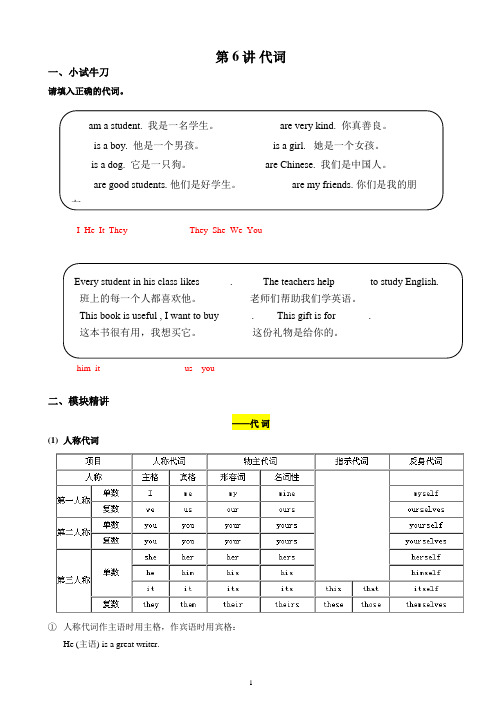
第6讲代词一、小试牛刀请填入正确的代词。
I He It They They She We Youhim it us you二、模块精讲——代词(1)人称代词①人称代词作主语时用主格,作宾语时用宾格:He (主语) is a great writer.___ am a student. 我是一名学生。
____ are very kind. 你真善良。
____ is a boy. 他是一个男孩。
____ is a girl. 她是一个女孩。
____is a dog. 它是一只狗。
____ are Chinese. 我们是中国人。
____ are good students. 他们是好学生。
____ are my friends. 你们是我的朋友。
Every student in his class likes______. The teachers help ______ to study English.班上的每一个人都喜欢他。
老师们帮助我们学英语。
This book is useful , I want to buy ______. This gift is for ______.这本书很有用,我想买它。
这份礼物是给你的。
They all like him(宾语)very much.②she可以用来代表国家,船只,大地,月亮等:China loves her people.③在并列的主语中,I 总放在最后:Xiao Yu and I are good friends.(2)物主代词①形容词型的物主代词只能作定语,如:my brother.②名词型的物主代词有充当名词的作用:Whose dictionary is this? ------ It’s mine.Ours is a big family.You may use my pen. I’ll use hers.(3) 反身代词I can’t express (表达) myself in English.That poor boy was myself.重要补充:①为了强调语气,表示“亲自”。
五升六-第六讲--英语学习-接打电话公开课获奖课件百校联赛一等奖课件

听不清/懂
Could you slow down, please?慢一点 I beg your pardon?/ Pardon? 再说一遍 Would you say that again? I don’t hear you very well.
打错电话
There’s no one named Anna here. 这儿没有叫安娜旳
Making a Phone Call
Words and phrases
Telephone [‘telifəun] (打)电话 Hold on [həuld] 等一等 Put through [θru:] 接通电话 Call back 回电话
Useful sentences
接通电话后旳问候
Hello 你好,相当于汉语中旳“喂”
自我简介
This is lili speaking. 我是李丽 This is lili from Great Wall Motor Company
找人
Can I speak to/with lili? 我想找李丽
问询对方
Who is that speaking?
你好,我想找苏珊。 不好意思,她目前不在,能够
留言吗? 不用了,我过会再打过来,谢
谢。 不客气。
Coke to speak to Susan.
I’m sorry, she’s not in at the moment. Can I take a message?
No , I’ll call back later. Thank you.
You’re welcome.
Conversation 2
你好,请找李丽? 请问你是哪位? 我是李雷。 请稍等。 李丽,有你旳电话。 好旳,谢谢。你好,这是李丽。
五升六英语短期语法专题

五升六语法专辑英语基础语法课程练习册1. 语法:一般现在时Warming-up表示经常的,习惯性的动作,常与表示频率的时间副词连用。
1. 表示经常性或习惯性的动作:I get up at six every day.2. 表示事物和人物的特征.状态:The sky is blue.3. 表示客观事实:The earth goes around the sun.关键词:day once, twice, three timesyear four times a weekmonth on Saturdaysevery week on Sundaysmorningafternoonevening句型:1. be 动词的变化肯定式:He is a teacher.否定式:He is not a teacher.一般疑问句:Is he a teacher? -Yes, he is. / No, he isn't.特殊疑问句:What is he?2. 行为动词的变化肯定式:I like pork. 第三人称单数:He likes pork.否定式:I don't like pork. 第三人称单数:He doesn't like pork.一般疑问句:Do you like pork? 第三人称单数:Does he like pork?-Yes, I do. / No, I don't. –Yes, he does. / No, he doesn't.特殊疑问句:What do you like? / What does he like?课堂巩固一. 将下列动词改为第三人称单数形式。
Model: do→ does1. fly _______2. skip _______3. play _______4. wash _______5. go _______6. watch _______7. study _______8. swim _______9. skate _______二. 用所给动词的适当形式填空。
小学英语五升六暑期讲义第9讲:名词(学生版)
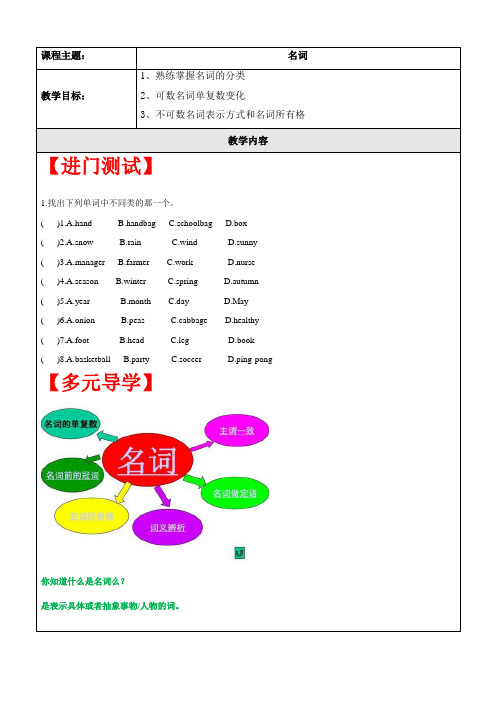
【进门测试】1.找出下列单词中不同类的那一个。
( )1.A.hand B.handbag C.schoolbag D.box ( )2.A.snow B.rain C.wind D.sunny ( )3.A.manager B.farmer C.work D.nurse ( )4.A.season B.winter C.spring D.autumn ( )5.A.year B.month C.day D.May ( )6.A.onion B.peas C.cabbage D.healthy ( )7.A.foot B.head C.leg D.book ( )8.A.basketball B.party C.soccer D.ping-pong 【多元导学】你知道什么是名词么?是表示具体或者抽象事物/人物的词。
【互动精讲】【知识梳理】考点一名词的分类名词是表示人或事物名称的词,它分为普通名词和专有名词两大类。
普通名词又分为可数名词和不可数名词。
可数名词包括个体名词和集体名词,有单数和复数之分;不可数名词包括物质名词和抽象名词,没有复数形式。
词条用法例词普通名词可数名词个体名词表示个体的人或事物的词book,desk,table,bike,plane集体名词表示一群人或一些事物的词family,class,police,team, group不可数名词物质名词表示构成各种物体的物质或材料的词glass,water,air,paper,wood抽象名词表示状态、品质、行为、感情等抽象概念的词danger,health,love,success, interest专有名词表示人、地方、事物、机构、组织等名称的词Alice,Canada,the Great Wall 考点二名词的数名词分为可数名词和不可数名词:1)不可数名词27.The w_______ on the bus go round and round.28.That man is my _________ (父亲).29.C______ start at 8 o’clock in the morning.30.Cinderella ____________________ (穿上) the new__________ (衣服) and new shoes.四、按要求填空将下列单词的复数形式改成单数形式。
五升六英语.pptx
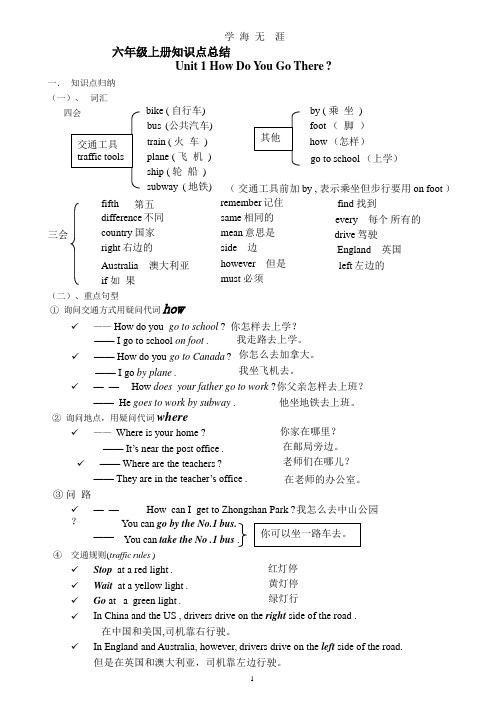
三会
subway ( 地铁) ( 交通工具前加 by , 表示乘坐但步行要用 on foot )
fifth 第五
remember 记住
find 找到
difference 不同
same 相同的
every 每个 所有的
country 国家
mean 意思是
drive 驾驶
right 右边的
side 边
England 英国
请问这附近有电影院吗?
Yes, there is.
有.
3. How can I get to the hospital?
我该怎样到达医院呢?
You can go … 二、指引路
1. You can go by the No.312 bus.
2. Get on / off at the … 3. Walk straight for three minutes. 4. Turn right/ left at the …
Australia 澳大利亚
however 但是
left 左边的
if 如 果
must 必须
(二)、重点句型
① 询问交通方式用疑问代词 how
✓ —— How do you go to school ? 你怎样去上学?
—— I go to school on foot .
我走路去上学。
✓ —— How do you go to Canada ? 你怎么去加拿大。
你可乘坐 312 路公交车去那儿. 在…地方上车/ 下车. 向前直走在分钟. 在… 地方向右/ 左转.
5. Walk east/ west/ south/ north for … minutes. 朝东/ 西/南/北/ 走…分钟.
小学英语五升六暑假讲义专题七----六年级上册Unit2新课讲义译林版三起
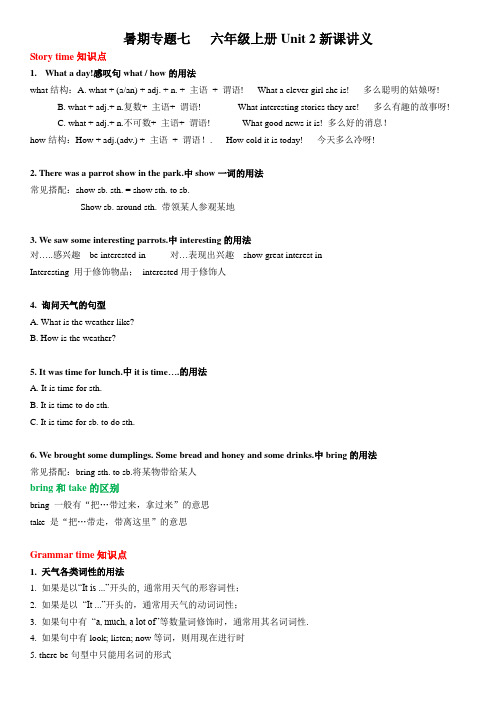
暑期专题七六年级上册Unit 2新课讲义Story time知识点1.What a day!感叹句what / how的用法what结构:A. what + (a/an) + adj. + n. + 主语+ 谓语! What a clever girl she is! 多么聪明的姑娘呀!B. what + adj.+ n.复数+ 主语+ 谓语! What interesting stories they are! 多么有趣的故事呀!C. what + adj.+ n.不可数+ 主语+ 谓语! What good news it is! 多么好的消息!how结构:How + adj.(adv.) + 主语+ 谓语!. How cold it is today! 今天多么冷呀!2. There was a parrot show in the park.中show一词的用法常见搭配:show sb. sth. = show sth. to sb.Show sb. around sth. 带领某人参观某地3. We saw some interesting parrots.中interesting的用法对…..感兴趣be interested in 对…表现出兴趣show great interest inInteresting 用于修饰物品;interested用于修饰人4. 询问天气的句型A. What is the weather like?B. How is the weather?5. It was time for lunch.中it is time….的用法A. It is time for sth.B. It is time to do sth.C. It is time for sb. to do sth.6. We brought some dumplings. Some bread and honey and some drinks.中bring的用法常见搭配:bring sth. to sb.将某物带给某人bring和take的区别bring 一般有“把…带过来,拿过来”的意思take 是“把…带走,带离这里”的意思Grammar time知识点1. 天气各类词性的用法1. 如果是以“It is ...”开头的, 通常用天气的形容词性;2. 如果是以“It ...”开头的,通常用天气的动词词性;3. 如果句中有“a, much, a lot of”等数量词修饰时,通常用其名词词性.4. 如果句中有look; listen; now等词,则用现在进行时5. there be句型中只能用名词的形式2.常见的动词过去式不规则变化总结am was 是(表示存在、状态等)are were 是(表示存在、状态等)bee became 成为;变成begin began 开始break broke 打破bring brought 拿来;取来;带来build built 构筑;建造;建筑buy bought 购买;买can could 可以;能;可能;会catch caught 赶上(车船等);捕获e came 来;来到cut cut 切;割;削;剪do/does did 做;干;行动draw drew 画drink drank 喝;饮drive drove 开车;驾驶eat ate 吃feel felt 感到;觉得find found 寻找;查找fly flew 飞行forget forgot 忘记;忘却get got 变得give gave 给;授予go went 去have/has had 得(病);患(病);有;吃;饮hear heard 听见;听说hide hid 隐藏keep kept 保持;使保持某种状态know knew 知道;了解Sound time知识点ear发音Near; hear……bear wear pearEarly learn earthheartCartoon time和checkout time知识点1. What’s the matter? 的用法同义句:What’s wrong with sb? 或者What happens to sb.?2. I lost my new bike.中lost的用法lost原型:lose 过去式:lost 形容词:lost常见搭配:迷路lose one’s way / be lost3. Sam wants to know why. 中想要做某事的表达方式A. want to do sth.B. would like to do sth.4. but it flew too high.中too + 形容词的用法too + adj.的常见搭配:太……而不能做某事be too adj. to do sth.5. It was windy on Monday morning. / I got up at 7 o’clock.中介词on; at的用法时间介词on / at / in的用法6. I went to school by bus/car/bike.中交通方式的表达骑自行车去公园ride a bike to the park go to the park by bike乘轿车去公园take a car to the park go to the park by car步行去公园walk to the park go to the park on foot乘公交车去公园take a bus to the park go to the park by bus拓展:by bus = on a bus by car = in a carby bike = on a bike by plane = on a plane注意:by bus表示介词短语不可能在句中作谓语动词Unit 2 What a day!短语总结重点词组1. What a day!多么……的一天!2. on 20th September 在9月20日3. in the morning 在上午4. a parrot show 鹦鹉展览5. go to the park by bike 骑自行车去公园6. some interesting parrots 一些有趣的鹦鹉7. bee windy and cloudy 变得有风和多云8. fly ki tes 放风筝9. high in the sky 高高地在天空中10. It’s time for lunch. 午饭的时间到了。
英华五升六考试内容(一)

英华五升六考试内容(一)
英华五升六考试内容
考试内容概览
•英语语言运用
–词汇与短语
–语法与句型
•阅读与理解
•写作与表达
•听力与口语
•文化与生活知识
英语语言运用
词汇与短语
•单词的拼写和意思辨析
•常用短语的理解和运用
语法与句型
•时态
•句型转换
•从句的应用
阅读与理解
•阅读文章的理解与把握•阅读理解题的解答技巧•推理与判断题的应对策略写作与表达
•书面表达
–书信
–日记
–感谢信等
•口头表达
–情景交际
–辩论演讲
–演讲等
听力与口语
•听力材料的理解与记录
•听力题的解答技巧
•口语表达与交流
文化与生活知识
•国内外文化知识
•时事新闻
•社会生活等
以上是英华五升六考试内容的一些概览,每个部分都对应着不同的知识点和技能要求。
英语语言运用部分主要考察学生在词汇和语法方面的掌握情况。
阅读与理解部分则测试学生对于英语文章的理解和分析能力。
写作与表达部分评估学生的书面和口头表达水平。
听力与口语部分则考察学生在听力和口语方面的技能。
最后,文化与生活知识部分拓宽学生的视野,培养他们的人文素养和社会意识。
通过全面系统的考察,英华五升六考试内容旨在培养学生全面发展的英语能力,提升他们在语言运用和交流方面的技能。
同时,通过注重文化与生活知识的考察,也促使学生对于英语背后的文化和社会背景有更多的了解。
希望同学们能够充分准备,自信应对英华五升六考试,展现出自己的才华和能力!。
五升六英语
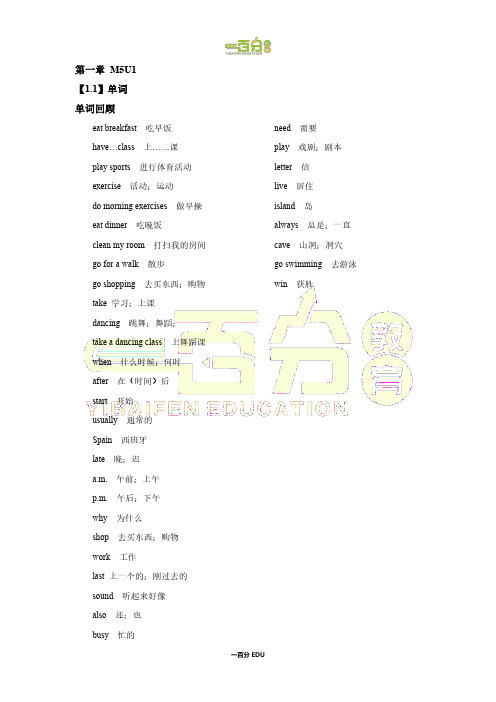
need 需要 play 戏剧;剧本 letter 信 live 居住 island 岛 always 总是;一直 cave 山洞;洞穴 go swimming 去游泳 win 获胜
一百分 EDU
Activities(活动) get up 起床 do morning exercises 晨练 have English class 上英语课 play sports 进行体育活动 play the piano 弹钢琴 go shopping 购物 go hiking 去远足 eat breakfast 吃早饭 eat dinner 吃晚饭
8 上舞蹈课____________
一百分 EDU
9 去散步____________ 11 起床________________ 13 打乒乓球________________ 15 做家庭作业________________
10 吃做饭________________ 12 在周末________________ 14 go swimming________________
△句型: ①询问做某事在几点 When do you+动词原形(短语)+其他? ——° At +时间 ——° I(+频度副词)+动词原形(短语)+at+时间。 例句:When do you get up in the morning? ——° At 7:30. ——° I often get up at 7:30. ②询问周末的活动安排
dinner. Shopkeeper: You’re so busy! You need a robit to help you! 5 、Let me see. From Monday to Wednesday, I usually collect nuts in the afternoon.
2019年五升六英语暑假新课课件 258页PPT

Chinese 语文
8
Maths 数学
9
English
英语
10
Science 科学
11
Music 音乐
12
Art 美术
13
History 历史
14
PE 体育
15
Drama 戏剧
16
French 法语
17
Geography 地理
18
ICT 信息技术
19
找朋友
English
Maths
47
Practice makes perfect.
熟能生巧
48
Let’s talk!
What do you like doing in English?
49
如何介绍自己的学校情况
Hello! I'm Lily. I come from China.
In our class there are 50
Mario
44
has 1. Sandra _____ got black hair. her EShnegl_lis_ih_k_is_e___sr_e_a_difnagvostuorritieessaunbdjuct.
listening to cassettes best.
45
has 2. Mario _____ got brown eyes.
Most pupils in our class like pop music. Four boys and
many more most
流行音乐
two girls have pets. Our classroom is great. We like our
五升六英语复习和延伸
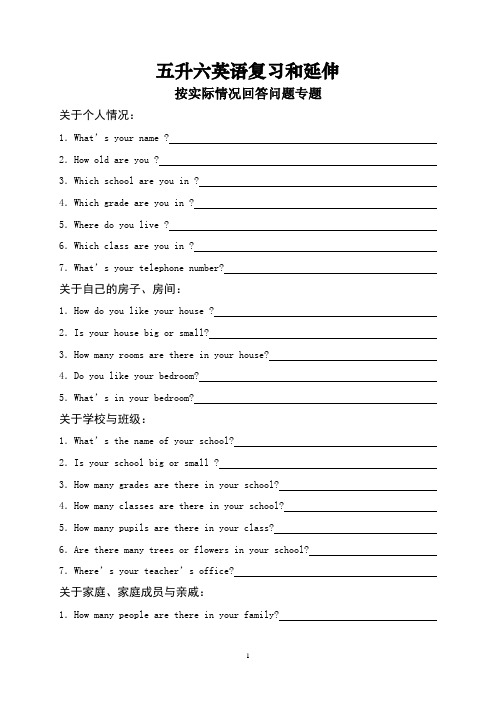
五升六英语复习和延伸按实际情况回答问题专题关于个人情况:1.What’s your name ? 2.How old are you ? 3.Which school are you in ? 4.Which grade are you in ? 5.Where do you live ? 6.Which class are you in ? 7.What’s your telephone number? 关于自己的房子、房间:1.How do you like your house ? 2.Is your house big or small? 3.How many rooms are there in your house? 4.Do you like your bedroom? 5.What’s in your bedroom? 关于学校与班级:1.What’s the name of your school? 2.Is your school big or small ? 3.How many grades are there in your school? 4.How many classes are there in your school? 5.How many pupils are there in your class? 6.Are there many trees or flowers in your school? 7.Where’s your teacher’s office? 关于家庭、家庭成员与亲戚:1.How many people are there in your family?2.What’s your father’s job? 3.What’s your mother’s job?4 Do you have any brothers or sisters?5.Are you the only child in your famlily?6.Do you have a cousin ?7.Is your father tall?8.Does your mother have long hair?关于时间、日期:1.What time is it now ?2.What day is it today?3.How many days are there in a week?4.What are they?5.How many days are there in a year?6.How many hours are there in a day?7.Is today your birthday?关于数字:1.What’s twelve and twenty?2.How much is zero and ten? 3.What’s two plus(加)forty?4.Is fifty-five plus forty-five one hundred?5.How much is your bag?关于服装:1.What colour is your coat?2.Does your your mother have any sweaters? 3.Do you wear sport shoes?4.Does your sister like new clothes?5.Do you like T-shirt or white T-shirt? 关于动物:1.Do you often go to the zoo? 2.What animals are there in the zoo? 3.What’s your favourite animal? 4.Do you like rabbits? 5.What colour is a panda? 关于食品和饮料:1.What’s your favourite food ? 2.What drink do you like ? 3.Do you like drinking apple juice or orange juice? 4.How do you like fish? 5.What do you usually have for breakfast? 关于日常生活:1.What do you usually do on Sunday and Saturday? 2.What time do you get up every day? 3.Do you go to the park with your parents? 4.What time do you go home in the afternoon? 5.What do you usually do after school? 6.Do you watch TV in the evening? 7.Do you go to bed late every day? 关于学校:1.What time do you get to school? 2.How many lessons have you got one day ? 3.Do you study Japanese at school ? 4.What subjects are you studying ?5.Do you often play games or sing songs in English classes? 6.What’s your favourite subject? 7.Who’s your English teacher? Do you like her? 关于体育运动:1.What’s your favourite sport? 2.Do you take exercise every day ? 3.Do you have sports after school? 4.Do you like swimming? 5.Who’s your favourit sport star? 6.Please tell me something about Yaoming. 关于兴趣与爱好:1.What’s your hobby ? 2.Are you good at playing the piano? 3.Does your father like fishing ? 4.Do you like shopping with your mother? 5.Does your English teacher like watching football? 关于能力:1.Can you sing and dance well?2.Can your father drive a car?3.Can you make kites?4.Can your family speak Chinese?同步练习一、按实际回答:1.Did you get up early yesterday morning?___________________2. What time did you have breakfast yesterday morning?__________________3.How did you go to school yesterday morning?_________________________4.How many lessons did you have yesterday?____________________________5. where did you have lunch yesterday?______________________6. Did you have sports yesterday?__________________________7. what did yiu do after dinner yesterday evening?______________________________________________________8. When did you go to bed last night?________________________9.Is your classroom the largest one in your school?____________________10.Is your school the largest in your city?__________________11.Is your bedroom larger than the living- room?_______________________12.Is your classroom the most comfortable in your school?__________________________________________________13. Did you clean classroom yesterday?____________________14. Is there a library in your school?_______________________15.Who’s your hero and who’s your heroine?__________________________________________________16.Did you read a book about Robin Hood?___________________17. Did you see a film about Sun Yatsen?_____________________18. Do you want to be a great leader when you grow up?______________________________________________________19.Do you want to be famous?_____________________________20. Can you name some famous leaders in the world?_____________________21.When were you born?_________________________22. Where were you born?________________________________________23. Are you the only child in your family?______________________________24. Who is the oldest in your family?_________________________________25. Did your father live in another city before?________________________26. What is your father’s job?______________________________27. Do you love Guangzhou?______________________________二、选择:( )1. Welcome_______my garden.A: on B: in C: to( )2.The baby was always ____trouble.A: on B: in C: at( )3. ___the lady angry when someone picked her flowers?A: Was B: Is C Will be( )5. I hope the young trees will grow______.A:well B: nice C: good( )6. The ____ of the trees turn yellow in autumn.A: leaf B: leave C: leaves。
五升六英语知识要点

一、问职业:What be + 主语?= What does /do +主语+do?eg. He is a teacher.(提问)_____? _____ he _____?二、表方式的短语1)on foot 2)by + 交通名词单数(无冠词)= in / on a (the; 物主代词;名词所有格)eg. 1、by bike = on a bike? by car = in a car?2、He goes to work by a bike every day.(改错)? _____________三、区别:have to : 有外部条件强加的客观上的“不得不” (存在各种时态)must: 个人主观上认为“必须”(无时态变化)eg. 1、I ___ stop on the way because of the rain.2、I ____ stop because I’m a little tired.四、提建议1、Shall we… ?? 答肯定:Good idea / OK /2、Let’s …???? All right3、Why not… ?? 语否定:No, let’s…? 肯定:Certainly/ Yes, please/另还可回答为Yes, I think so/ I’d love to否定:No,I don’t think so / I’m afraid not.五、put on强调“穿”的动作:穿上,戴上后接wear是put on 之后的结果:穿着? ? “衣服”= be in??? 名词dress sb: 给某人穿衣eg. 1、You’d better ____ more clothes when you go out. It’s cold outside.A. wear ?B. dress? ?C. put on?D. take off? ?2、The boy can _____ himself now. A. wear ? B. dress? C. put on? D. take off? 3、Tom is wearing a red shirt today.六、在具体的某楼前用oneg. He lives on the fifteenth floor.△七、How do you like… ? 你觉得……怎么样?= What do you think of … ?eg. How do you like the new film? = What do you think of the new film? 你觉得这部新电影怎么样?八、a little = a bit 但注意:1) a little+名词= a bit of + 名词)eg.There is a little( a bit of ) water in the glass.九、? marry sb = be married to sb.与某人结婚? get married = be married 已婚;结婚(但get married是“短命”动词,要指“结婚多久”应用be married)eg. 1、She married with a doctor (找错) ______? 2、She has got married for ten years (找错) __________十、leave sth + 地点:把某物忘在某地? forget sth : 忘记某事eg. 1)He ______ the driver’s license yesterday.? 2)I ____ my umbrella in the train just now.十一、感叹句1、What (a, an) + 形+ 名(+主+ 谓)!(注:但名词为不可数、复数时,则不用a / an)2、How + 形/ 副(+ 主+ 谓)!eg.1)________ bad weather!2)______ hard they are working!? 3)______ good girl she is! 4)_____ beautiful flowers they are!十二、“雨大,雪大”heavy---heavily/ hard “风大” strong---strongly?△18.so 句型? ? so + be(助、情) + 主语:“也如此”? ? so + 主语+ be(助、情):“的确如此”Eg.1、I watched TV last night, and so did she. 昨晚我看了电视,她也看了。
五升六+名词专题专项提升(讲义)教科版(广州)英语五年级下册

名词专题一、名词基础知识知识点1.名词的定义和分类1) 定义:名词表示人、地方、事物或抽象概念的统一名称。
2) 名词按数量可分为两大类:__________名词和__________名词。
3) 可数名词是指能以数目来计算,可以分成个体的人或东西。
4) 不可数名词是指不能以数目来计算,不可以分成个体的概念、状态、品质、感情或表示物质材料的东西。
常见不可数名词有颗粒,粉尘,气体,液体,物质,抽象概念等。
①液体: _________________________________________________________②自然现象:_________________________________________________________③食品类: _________________________________________________________④抽象概念:_________________________________________________________5) 有些名词既可作为可数名词也用作不可数名词,但意义上有变化。
如:fish __________ __________ chicken__________ __________orange __________ __________ time__________ __________glass__________ __________ paper __________ __________room __________ __________6) 可数名词通常有__________和__________两种形式;不可数名词通常__________复数形式。
例 1. 请归类可数名词和不可数名词,把该单词的编号写在相应的位置上。
book milk rice bun soup water tea hamburger desk bread money banana egg coffee meat tree pork tooth pen beef chair1.可数名词:__________________________________________________________2.不可数名词:_______________________________________________________知识点2:可数名词的数1) 一般情况下,在单数名词词尾加__________。
- 1、下载文档前请自行甄别文档内容的完整性,平台不提供额外的编辑、内容补充、找答案等附加服务。
- 2、"仅部分预览"的文档,不可在线预览部分如存在完整性等问题,可反馈申请退款(可完整预览的文档不适用该条件!)。
- 3、如文档侵犯您的权益,请联系客服反馈,我们会尽快为您处理(人工客服工作时间:9:00-18:30)。
2、 I
Байду номын сангаас
stop because I’m a little tired.
四、提建议 1、Shall we… ? 答 肯定:Good idea / OK /
2、Let’s …
All right
3、Why not… ?
语 否定:No, let’s…
肯定:Certainly/ Yes, please/
另还可回答为 Yes, I think so/ I’d love to 否定:No,I don’t think so / I’m afraid not.
1) We must find out a good way to solve the
.
2) You can answer the
in your own words.
十四、borrow: 借进 borrow … from 从…借
36. lend: 借 出 lend sb sth = lend sth to sb
但注意:1) a little+名词 = a bit of + 名词 )
eg.There is a little( a bit of ) water in the glass. 九、 marry sb = be married to sb.与某人结婚 get married = be married 已婚;结婚
eg.1)
bad weather!2)
hard they are working!
3)
good girl she is! 4)
beautiful flowers they are!
十二、“雨大,雪大” heavy---heavily/ hard
“风大” strong ---strongly
△18.so 句型
(但 get married 是“短命”动词,要指“结婚多久”应用 be married) eg. 1、She married with a doctor (找错)
2、She has got married for ten years (找错) 十、 leave sth + 地点:把某物忘在某地
forget sth : 忘记某事
eg. 1)He
the driver’s license yesterday.
2)I
my umbrella in the train just now.
十一、感叹句
1、What (a, an) + 形 + 名(+主 + 谓)!(注:但名词为不可数、复数时,则不用a / an)
2、How + 形 / 副 ( + 主 + 谓)!
五、 put on 强调“穿”的动作:穿上,戴上 后接
wear 是 put on 之后的结果:穿着 “衣服”
= be in 名词
dress sb: 给某人穿衣 eg. 1、You’d better
more clothes when you go out. It’s cold outside.
A. wear B. dress C. put on D. take off
so + be(助、情) + 主语:“也如此”
so + 主语 + be(助、情):“的确如此”
Eg.1、I watched TV last night, and so did she. 昨晚我看了电视,她也看了。
2、I watch TV every day, and so does he. 我每天看电视,他也如此。
一、问职业:
学海无 涯
What be + 主语?= What does /do +主语+do?
eg. He is a teacher.(提问)
he
?
二、表方式的短语
1)on foot
2)by + 交通名词单数(无冠词) = in / on a (the; 物主代词;名词所有格)
eg. 1、by bike = on a bike by car = in a car
2、He goes to work by a bike every day.(改错)
三、区别: have to : 有外部条件强加的客观上的“不得不” (存在各种时态)
must: 个人主观上认为“必须”(无时态变化)
eg. 1、 I
stop on the way because of the rain.
把某物借给某人
△48.计量:表事物的“长、宽、高、深、远、厚”用 “long ; wide ; high / tall ; deep ; away ; thick. 1)Mr Green is nearly two metres
2)The ice is about one metre
.
3)Our classroom is about twelve metres
2、The boy can
himself now. A. wear B. dress C. put on D. take off
3、Tom is wearing a red shirt today. 六、在具体的某楼前用 on
eg. He lives on the fifteenth floor.
1
and eight metres
.
3
学海无涯
△七、How do you like… ? 你觉得……怎么样? = What do you think of … ?
eg. How do you like the new film? = What do you think of the new film? 你觉得这部新电影 怎么样?
八、a little = a bit
3、I can swim, so I can. 我会游泳,真的是这样。
2
十三、problem 与 question
学海无涯
question: 指人们主观上产生而提出等待回答的问题。常与 ask , answer 连用
problem: 指客观上存在等待解决的问题着重指“难题”。常与 solve , work out 连用
